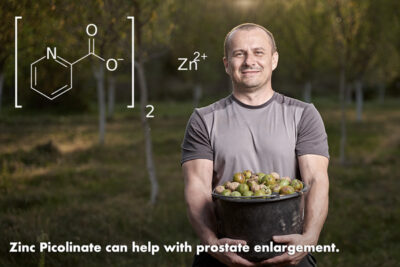For PROSTATE ENLARGEMENT, zinc picolinate helps to reduce prostate enlargement, improve bladder emptying and urine flow, and to decrease nocturnal bathroom trips. Zinc is proving to be as helpful with enlarged prostates as it is with inflamed ones, since zinc deficiency results in benign prostatic hyperplasia, also known as BPH. This essential trace metal plays a unique role in prostate health, as the cells surrounding the prostate gland are highly specialized to accumulate zinc at a 10 to 15 times higher concentration than other body tissues.

The established U.S. RDA for zinc is a low 15mg per day, yet very few men obtain even this amount. In addition to being found in all organs, tissues, and fluids in the body, zinc ranks just behind iron as the most abundant trace mineral in the body. It plays a critical role in a host of biological processes and is essential for testosterone metabolism. Despite having such critical functions, it is not stored in the body and requires a regular dietary or supplemental intake. Men over 40 are wise to consider zinc supplementation, as it is key for maintaining optimal prostate tissue zinc levels, as well as for a healthy immune system, skin and stomach function.
Zinc is highly concentrated in the prostate and testes. Prostate cells accumulate more zinc than do cells in any other human tissue. Zinc is important for the synthesis of testosterone and it is critical to normal prostate function. That walnut-sized organ actually has the highest levels of zinc in a man’s body. Stabilizing hormone production is an important step in maintaining the health of an aging prostate, since hormone production changes in older years. An enzyme in men’s bodies called 5-alpha-reductase converts testosterone to dihydrotestosterone (DHT), a breakdown product. This leads to actual testosterone levels dropping, gradually declining more over time, causing an imbalance between testosterone and estrogen. This can contribute to benign enlargement of the prostate. Zinc helps prevent excessive breakdown of testosterone, to maintain more youthful levels of this essential male hormone.
For BPH, zinc may also help by blocking the formation of an estrogen, called estradiol, from testosterone. Estradiol normally exists in tiny amounts in men’s bodies, but an excess can contribute to the prostate hypertrophy of BPH. Research has shown that zinc impedes the metabolic step called aromatization, where estradiol is made from androgens including testosterone. A study published in the Journal of Nutrition found that a zinc-deficient diet leads to a significantly greater formation of estrogen from testosterone. Zinc deficiency impedes the liver’s breakdown of the body’s steroid hormones, resulting in lower levels of healthy testosterone along with excessive estrogen.
Research confirms that zinc has significant prostate-protective properties. Results of a 2011 study showed that prostate tissue from men with BPH had significantly less zinc than normal prostate tissue. The study also found an increase in urinary zinc excretion, meaning that men with BPH were losing more zinc.3
Further cellular research shows that zinc exposure plays an important role in reducing excessive cell growth or hyperplasia in BPH.5 Researchers at the University of Maryland showed that exposing human prostate cells from BPH tissue to zinc induced cell suicide, and they identified the specific genes involved. This study provided an extensive database on zinc-related prostate research: The results suggested that zinc regulation of gene expression is cell-type specific, meaning that certain genes are highly regulated by zinc. Zinc may also help to reduce the risk of developing cancerous prostate cells.
In our clinic, we see the best results with the picolinate form of zinc for men with BPH. Many of them are experiencing improved urine flow, more complete bladder emptying, and less sleep disruption from nighttime bathroom visits. Zinc is always best taken with food, at any meal.
Recommendation: Zinc picolinate 30mg, one or two times daily, with any meals, or as directed by your healthcare provider.
References
- Zaichick V, Sviridova TV, Zaichick SV. Zinc in the human prostate gland: normal, hyperplastic and cancerous. Int Urol Nephrol. 1997;29(5):565-74.
- Bedwal, R. S., and A. Bahuguna. “Zinc, copper and selenium in reproduction.” Experientia 50.7 (1994): 626-640.
- Christudoss P, Selvakumar R, Fleming JJ, Gopalakrishnan G. “Zinc status of patients with benign prostatic hyperplasia and prostate carcinoma.” Indian Journal of Urology: Journal of the Urological Society of India. 2011;27(1):14-18.
- Lin SF et al. Profiling of zinc-altered gene expression in human prostate normal vs cancer cells: a time course study. J Nutr Biochem 2009 Dec; 20(12): 1000-12.
- Yan M et al. Differential response to zinc-induced apoptosis in benign prostate hyperplasia and prostate cancer cells. J Nutr Biochem 2010 Aug; 21(8): 687-94.